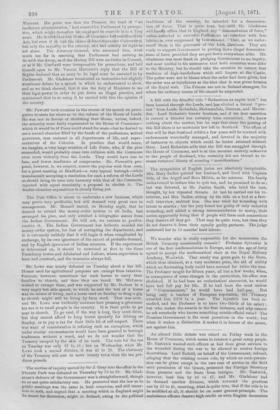Mr. Fawcett took occasion in the course of his speech
on prero- gative to state his views as to the reform of the House of Lords. He was not in favour of abolishing that House, unless, indeed, the minority were fairly represented in the House of Commons— which it would be if Peers could stand for seats—but he desired to see a second chamber filled by the heads of the professions, retired governors, men eminent in all departments of life, and repre- sentatives of the Colonies. In practice that would mean, we imagine, a very large creation of Life Peers, who, if the plan succeeded, would probably come into collision with the Commons even more violently than the Lords. They would have less to lose, and fewer traditions of compromise. Mr. Fawcett's pro- posal, however, is, we suspect, nearer the popular wish than ours, for a groat meeting at Bradford—a very typical borough—while unanimously accepting a resolution for such a reform of the Lords as should bring its tone into harmony with that of the Commons, rejected with equal unanimity a proposal to abolish it. The double-chamber superstition is clearly living yet.






























 Previous page
Previous page